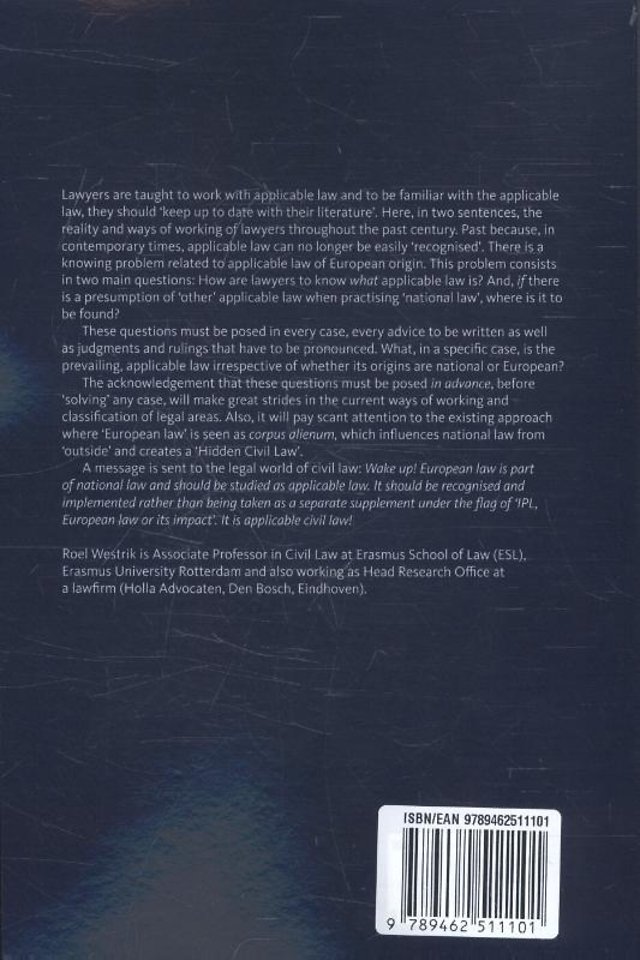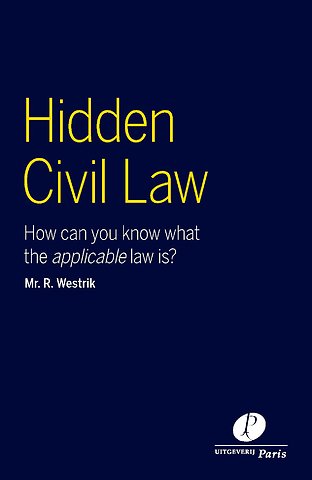



Roel Westrik is als Universitair hoofddocent privaatrecht verbonden aan de Erasmus School of Law (ESL) van de Erasmus Universiteit Rotterdam en als Hoofd Wetenschappelijk Bureau werkzaam bij Holla Advocaten (Den Bosch, Eindhoven).
Meer over Roel WestrikHidden Civil Law
How can you know what the applicable law is ?
Paperback Engels 2016 1e druk 9789462511101Samenvatting
Lawyers are taught to work with applicable law and to be familiar with the applicable law, they should ‘keep up to date with their literature’. Here, in two sentences, the reality and ways of working of lawyers throughout the past century. Past because, in contemporary times, applicable law can no longer be easily ‘recognised’. There is a knowing problem related to applicable law of European origin. This problem consists in two main questions: How are lawyers to know what applicable law is? And, if there is a presumption of ‘other’ applicable law when practising ‘national law’, where is it to be found?
These questions must be posed in every case, every advice to be written as well as judgments and rulings that have to be pronounced. What, in a specific case, is the prevailing, applicable law irrespective of whether its origins are national or European?
The acknowledgement that these questions must be posed in advance, before ‘solving’ any case, will make great strides in the current ways of working and classification of legal areas. Also, it will pay scant attention to the existing approach where ‘European law’ is seen as corpus alienum, which influences national law from ‘outside’ and creates a ‘Hidden Civil Law’.
A message is sent to the legal world of civil law: Wake up! European law is part of national law and should be studied as applicable law. It should be recognised and implemented rather than being taken as a separate supplement under the flag of ‘IPL, European law or its impact’. It is applicable civil law!
Trefwoorden
europees recht burgerlijk recht privaatrecht wetgeving geldend recht rechtswetenschap kenprobleem doorwerking toepasselijk recht juridische praktijk rechtspraktijk rechtspraak unierecht nationale wetgeving hof van justitie juridisch onderwijs europa rechtsbeoefening rechtsvorming juridische methodologie rechtsstelsel rechtssysteem internationaal recht bestuursrecht prejudiciële procedure richtlijnen rechtsnormen voorrang rechtstoepassing rechtsbronnen
Trefwoorden
Specificaties
Lezersrecensies
Inhoudsopgave
U kunt van deze inhoudsopgave een PDF downloaden
1. Introduction: a knowing problem
2. Nature of the knowing problem
3. The ‘applicable law’ paradoxes
4. The outmoded dichotomy
5. Hidden applicable law
5.1 Applicable law: where can it be found in (national) legislation and literature?
5.2 Applicable law: where can in it be found in the legislation of European origin?
5.3 Do EU Directives have a direct or an indirect impact?
5.4 Is there any applicable primary law of European origin ‘at the base’ of my case?
5.5 How should a lawyer ‘anticipate’ the standards set by the ECJ?
5.6 What takes priority: the text of a directive or the rationale of that directive? A narrow or a broad explanation? One of each?
5.7 Who has the last word: the ECJ or the national court? Is the ECJ going to take the place of the national courts?
5.8 Is there a ‘step-by-step plan’ to find the applicable law?
5.9 May a Member State’s ‘own legislation’ be stricter?
5.10 Is there a system in the legal practice of the ECJ, or is it simply law of precedent?
5.11 How can we know whether the language read by lawyers ‘says what it says’?
5.12 Is a cross-border aspect necessary for the applicability of ‘European law’?
5.13 Do territorial and/or substantive borders still exist for the implementation of applicable law from a European source?
5.14 Do we know whether the legal terms are correct?
5.15 When is the existing legal system not, or no longer, apparently correct?
6. The ‘knowing problem’: conclusion
7. Where to go from here?
Index of Jurisprudence
Anderen die dit boek kochten, kochten ook
Rubrieken
- advisering
- algemeen management
- coaching en trainen
- communicatie en media
- economie
- financieel management
- inkoop en logistiek
- internet en social media
- it-management / ict
- juridisch
- leiderschap
- marketing
- mens en maatschappij
- non-profit
- ondernemen
- organisatiekunde
- personal finance
- personeelsmanagement
- persoonlijke effectiviteit
- projectmanagement
- psychologie
- reclame en verkoop
- strategisch management
- verandermanagement
- werk en loopbaan





